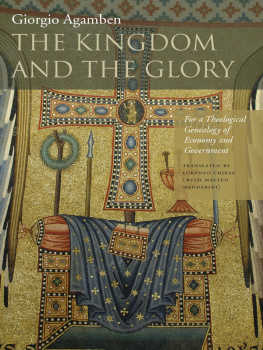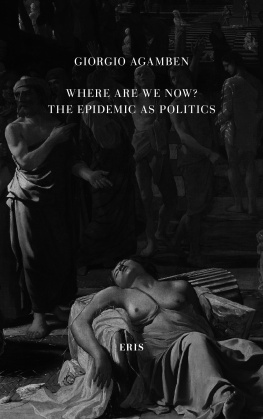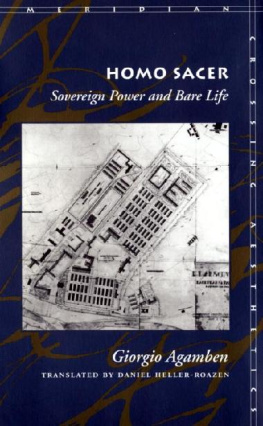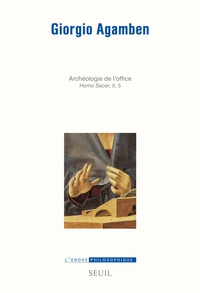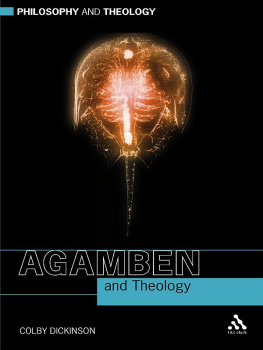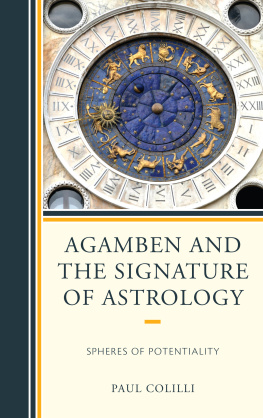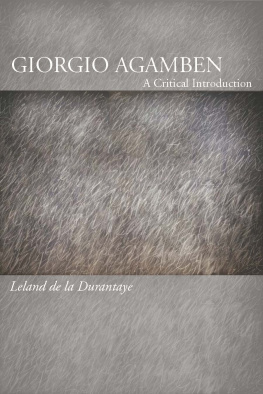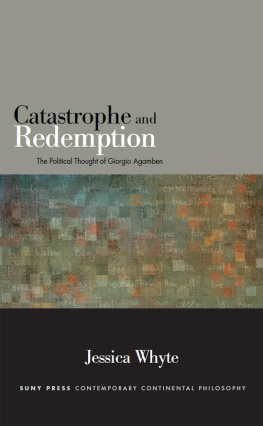Stanford University Press
Stanford, California
English translation 2013 by the Board of Trustees of the Leland Stanford Junior University. All rights reserved.
Opus Dei: An Archaeology of Duty was originally published in Italian under the title Opus Dei. Archeologia dellufficio 2012 by Giorgio Agamben. Originally published by Bollati Boringhieri editore, Torino.
This book was negotiated through Agnese Incisa Agenzia Letteraria, Torino.
No part of this book may be reproduced or transmitted in any form or by any means, electronic or mechanical, including photocopying and recording, or in any information storage or retrieval system without the prior written permission of Stanford University Press.
Printed in the United States of America on acid-free, archival-quality paper
Library of Congress Cataloging-in-Publication Data
Agamben, Giorgio, 1942 author.
[Opus Dei. English.]
Opus Dei : an archaeology of duty / Giorgio Agamben ; translated by Adam Kotsko.
pages cm. (Meridian : crossing aesthetics)
Originally published in Italian under the title Opus Dei. Archeologia dellufficio.
ISBN 978-0-8047-8403-0 (cloth : alk. paper)
ISBN 978-0-8047-8404-7 (pbk. : alk. paper)
1. Liturgics. 2. Duty. 3. Ontology. I. Kotsko, Adam, translator. II. Title. III. Series: Meridian (Stanford, Calif.)
BV176.3.A4313 2013
264'.02dc23
2013007602
ISBN 978-0-8047-8856-4 (electronic)
OPUS DEI
An Archaeology of Duty
Giorgio Agamben
Translated by Adam Kotsko
Stanford University Press
Stanford, California 2013
MERIDIAN
Crossing Aesthetics
Werner Hamacher
Editor
Contents
Translators Note
One difficulty facing the translator of this work was the multiplicity of Italian terms connoting the concept of duty. The first is ufficio, which primarily connotes duty but can also mean office in the sense, for example, of holding a political office. (Though the English term office can carry connotations of duty, this meaning is somewhat antiquated.) Like the Latin term officium, which plays a decisive role in Agambens archaeological investigation, this term can also refer to the Divine Office or liturgy. I have rendered this term as office, duty, or office or duty, depending on the context, and have frequently left the Italian word in brackets. Most notably, the term ufficio is rendered as duty in the subtitle of the work as a whole but as office in the title of the third chapter.
A related word is dovere, a noun meaning duty and also the infinitive of the Italian auxiliary verb meaning must, should, ought to, to have to. One challenge in translating this term comes in Agambens references to two ontologies, one of essere and one of dovere-essere. This distinction is often captured in English by juxtaposing the terms is and ought, but that conventional translation lacks the connotations of the imperative or command that Agamben associates with the ontology of dovere-essere. Thus I translate this contrast as one between being and having-to-be.
Finally, a much less frequent term is vece, which carries connotations of duty, as well as alteration and vicarious action (as in the phrase fare le veci, to act in someones place or stead). When this term occurs, I have translated it according to the context but left the Italian word in brackets.
Another difficulty stems from words related to the Latin term effectus: the Italian effettuale, effettualit, etc. In Italian these terms are generally translated with words like real, actual, or true, but to emphasize the etymological connections Agamben is making, I have chosen to translate them more literally with the English terms effective or effectiveness.
Works are cited according to the page number of the original text, followed by the page number of the English translation (where applicable), or else by a standard textual division that is consistent across translations and editions. All translations from the Bible are based on the New Revised Standard Version. Translations have been frequently altered throughout for greater conformity with Agambens usage. Where no English translation is listed in the bibliography, the translations are my own. Where the main text is a close paraphrase of a Latin quotation or where Agambens purpose in quoting a Latin text is simply to demonstrate the presence of a particular term or phrase in that text, I have often opted not to provide an English translation in order to avoid redundancy.
I would like to thank Giorgio Agamben, Kevin Attell, Colby Dickinson, David U. B. Liu, and Harold Stone for their suggested improvements; Virgil Brower and the rest of the Paul of Tarsus Interdisciplinary Working Group at Northwestern University for inviting me to discuss a portion of the translation; Junius Johnson for providing his translation of Agambens quotations from Innocent IIIs De sacro altaris mysterio; Michael Hollerich for providing his translation of Petersons Theological Tractates; Henrik Wilberg and Kieran Healy for bibliographical assistance; and Emily-Jane Cohen, Emma Harper, and the rest of the staff of Stanford University Press.
Preface
Opus Dei is a technical term that, in the tradition of the Latin Catholic Church that starts from the Rule of St. Benedict, designates the liturgy, that is, the exercise of the priestly office of Jesus Christ.... In the liturgy the whole public worship is performed by the Mystical Body of Jesus Christ, that is, by the Head and His members (Vatican Council II, Constitution of the Sacred Liturgy, December 4, 1963).
The word liturgy (from the Greek leitourgia, public services) is, however, relatively modern. Before its use was extended progressively, beginning at the end of the nineteenth century, we find in its place the Latin officium, whose semantic sphere is not easy to define and in which nothing, at least at first glance, would seem to have destined it for its unusual theological success.
In The Kingdom and the Glory we investigated the liturgical mystery above all in the face it turns toward God, in its objective or glorious aspect. In this volume our archaeological study is oriented toward the aspect that above all concerns the priests, that is, the subjects to whom belongs, so to speak, the ministry of the mystery. And just as in The Kingdom and the Glory we sought to clarify the mystery of the economy, which theologians had constructed by reversing a Pauline expression that was clear in itself, here it is a matter of tearing the liturgical mystery out of the obscurity and vagueness of the modern literature on the subject, returning it to the rigor and splendor of the great medieval treatises of Amalarius of Metz and William Durand. The liturgy is, in truth, not very mysterious at all, to the point that one can say that, on the contrary, it coincides with perhaps the most radical attempt to think a praxis that would be absolutely and wholly effective. The mystery of the liturgy is, in this sense, the mystery of effectiveness, and only if one understands this arcane secret is it possible to understand the enormous influence that this praxis, which is only apparently separate, has exercised on the way in which modernity has thought both its ontology and its ethics, its politics and its economy.
As happens in every archaeological study, this one leads us well beyond the sphere from which we started. As the diffusion of the term office in the most diverse sectors of social life attests, the paradigm that the Opus Dei
Next page

